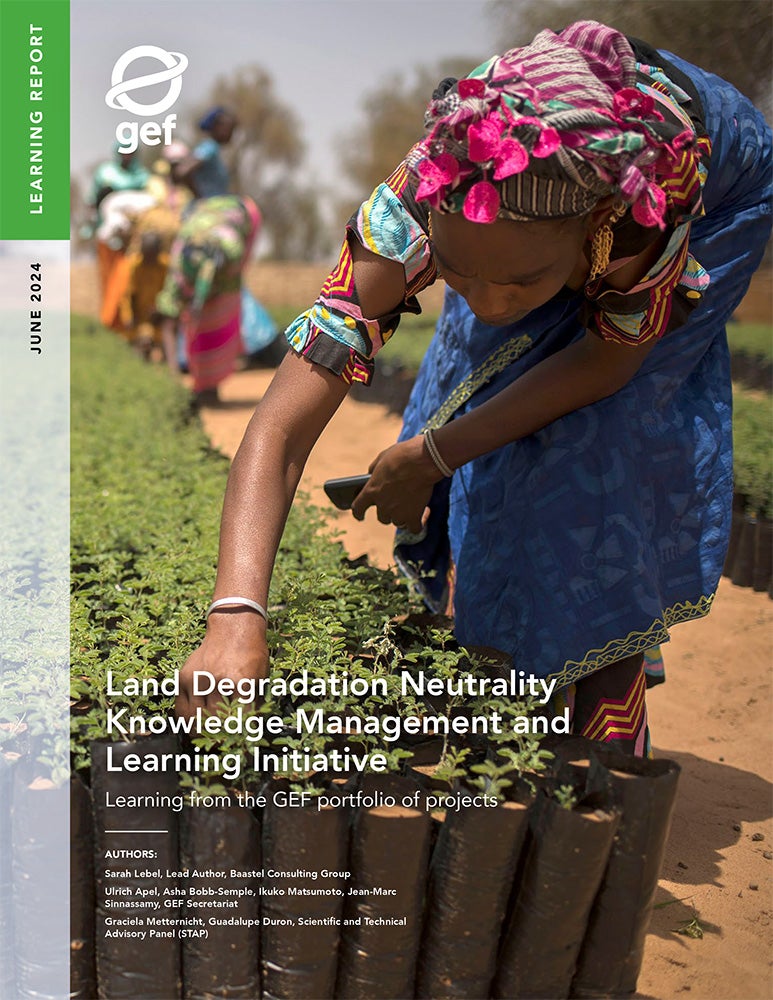The purpose of this learning report is to generate knowledge and share experience with the implementation of land degradation neutrality (LDN) to create a better understanding of practices that work best for mainstreaming LDN into national sustainable development agendas, learning from ongoing applications of the LDN framework in the portfolio of Global Environment Facility projects.
The portfolio comprises 67 projects approved between 2016 and 2022 during the GEF-6 and GEF-7 replenishment cycles, implemented in a total of 56 countries covering all regional United Nations Convention to Combat Desertifcation (UNCCD) Annexes. The projects are implemented by nine different GEF agencies and are in various stages of implementation ranging from project preparation to mid-term evaluation stage. The total investment in these projects is $320 million in GEF grants and over $2.5 billion in co-financing.
The desk review of the entire portfolio shows that LDN pathways are well integrated in project design, with projects harnessing multiple synergies, most notably between LDN and biodiversity objectives. The review also indicates that the use of the LDN guidelines developed by the GEF’s Scientific and Technical Advisory Panel is significantly improving the integration of the LDN concept in project designs. Most projects address policy coherence at the national level and half of them include elements for LDN mainstreaming in national policy and regulatory frameworks.
A further in-depth assessment of 10 selected LDN projects revealed various best practices and generated valuable lessons in early implementation stages of these projects.
Among the best practices that are applied in the case studies are integrated land use planning and LDN monitoring frameworks that facilitate cross-sectoral coordination, the use of the LDN framework to enhance policy coherence, stakeholder engagement to integrate LDN into local planning processes, addressing land tenure and gender equality as enabling factors for LDN, engaging with the private sector as a factor for success, and leveraging innovative financing mechanism to support LDN implementation.
The main lessons emerging from the portfolio are the following:
- LDN is a complex scientific concept that needs to be tailored to national and local realities and adjusted to each country’s context. Countries employ innovative ways to operationalize the LDN concept, which takes time and resources. This includes the translation of the concept to various ministries at the decision-making level and to lower administrative and technical levels, as well as awareness building to popularize the LDN concept to the broader public.
- Numerous challenges and information gaps still exist in setting, updating, revising, and monitoring voluntary LDN targets. Data accessibility varies between countries: from defining baselines to monitoring progress against targets, with access to geospatial data, which is central to LDN implementation to identify gains and losses, being particularly challenging.
- LDN guidelines for GEF projects have a positive impact on effective integration of the LDN concept in project design. However, they are not all fit-for-purpose in guiding LDN implementation. The report highlights the importance of both theoretical guidelines for shaping project design, and the urgent need for practice-oriented guidelines for subsequent implementation, focusing on an inclusive assessment of LDN action entry points within each country, to prioritize actions to support achieving LDN targets.
- Governance for LDN is multi-dimensional and needs to take into consideration vertical and horizontal (cross-sectoral) coordination as a first step for better policy coherence; participatory planning processes; potential trade-offs and competing land uses; land tenure security; and accurate monitoring.
- The LDN framework provides countries with the opportunity to work—and address enhanced policy coherence—across ministries and agencies on multi-sectoral topics related to biodiversity; climate change mitigation; adaptation; drought; agriculture and livestock; and forests through various means including integrated land use planning.
- Fostering inclusivity through LDN is crucial to ensure sustainability and impact. Engagement with stakeholders should be context-specific and based on local and regional conditions. Indigenous Peoples and local communities’ role in project design, implementation, and monitoring and conflict mitigation at the local level contribute to sustainability and impacts of the LDN projects. It is critical to address challenges of gender engagement to achieve inclusivity and equal representation.
The findings and lessons have implications for the wider GEF partnership and engagement with countries to enhance the implementation of the UNCCD mandate. The LDN framework has tremendous potential as an entry point for national policy coherence and to scale up sustainable land management globally; however, it is important to improve the way the concept is communicated to make it more politically appealing for decision makers. Countries that are striving to implement their LDN targets need to set up a structured process adapted to their specific context. They require guidelines that are more practice-oriented and help identify LDN action entry points, such as monitoring, legal framework, capacity building, and gap analysis. Monitoring and reporting of LDN target implementation needs to be facilitated by the GEF partnership and engagement with countries so that global progress towards LDN can be assessed in a timely manner. It is important to recognize that specific national priorities, such as proactive drought management, food security, and water security should be viewed as linked to the LDN concept and not as separate issues.
The collaborative sharing of experiences and joint learning from ongoing projects emerges as essential for mainstreaming the LDN concept into project implementation and, ultimately, national policies. This dynamic and adaptive learning process not only enhances the usefulness and wider application of LDN, but also serves as a valuable feedback mechanism, informing future strategies for achieving LDN and advancing other national priorities such as drought management, adaptation to a changing climate, and food security.
As the GEF’s LDN project portfolio matures and expands, both in terms of implementation progress and through addition of new projects, more learning opportunities will arise and be taken up through various means.
